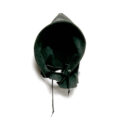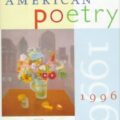The One Who Find Our Way: Finding My Mother in “Diving into the Wreck”
In my junior year in college I enrolled in a two-credit course in typesetting. The final project involved hand-setting a poem of our choice. I may have been the only English major in the class, but my classmates didn’t all select greeting-card verse or bawdy ballads. Someone picked an Emily Dickinson poem. Someone else chose an ee cummings piece. I was, however, the only student who chose a poem by a living writer, and certainly the only one to choose an overtly political work: Adrienne Rich’s “Diving into the Wreck.”
The poem was only five or six years old then. Rich’s categorization as a political, feminist writer was still fairly new, though already some of her earlier works were widely anthologized. Some editors were even—tentatively, it seemed—choosing a few of her new poems for their anthologies. “Diving into the Wreck” must have been the most anthologized of these. It was clear, direct, and challenged conservative sensibilities without being too baldly threatening. For professors interested in teaching forms and poetics, it provided an excellent example of a central driving metaphor. I first read the poem in a composition course, in which literature provided the heuristic for first-year student writing. My professor taught the poem as an extended metaphor, and dodged its politics while feeling smug about teaching a so-called dangerous text.
Rich transforms her mostly plain language into a ghostly, haunting song, and I remember sensing echoes all through the chambers of her metaphorical wreck—words like “vermeil” and phrases like “the wreck and not the story of the wreck” pinned themselves to my aesthetic consciousness. By my junior year, when I handset Rich’s poem, I was more aware of politics. I felt I understood the poem, but I didn’t, not as much as I needed to, and most of its appeal to me—just as for my conservative English 102 professor—lay in its danger. Choosing to set the poem as my final class project was a statement to my typesetting class: “Look at me, an immigrant Japanese American male college student who understands Adrienne Rich.” I was secretly delighted when a couple of classmates glanced at the poem and looked puzzled, or hostile.
Though its lines are short—a few have only one or two or three words—“Diving into the Wreck” was still one of the longer poems being set. I had presumed, with its minimal punctuation and its short lines, that I would be able to set it quickly. But the poem is nearly one hundred lines long, setting type by hand is an arduous work, and one slip of a letter can ruin a day’s worth of leading and quoining. I was among the slowest, and one of the last to finish the project.
As I painstakingly set the poem, I began to realize how much Rich’s sense of phrasing differed from my own. I had to stop myself from moving “half-wedged” up to the end of the line “obscurely inside barrels”; to refrain from enclosing “besides” inside commas in the lines that say “and besides / you breathe differently down here.” The professor wanted us to set a poem in order to practice the precision that typesetting requires. But knowing that the work demands such care and precision is different from putting those qualities into practice.
So I learned, by hand, Rich’s sense of phrasing, somehow fluid and disruptive. I wondered at how it could be both, as in the lines, “I stroke the beam of my lamp / slowly along the flank / of something more permanent / than fish or weed.” I began to see, perhaps for the first time, that the way a poet writes also determines what a poet says.
Traditional quest narratives usually focus on men. Maybe the men are callow and idealistic, and the hard lessons they learn along the way become their own reward, the real goal of the journey. Or maybe the men are not so young, are already hardened to life, and the attainment of their goal means the keeping of a promise made long ago, or the rescue of suffering people, or of a suffering woman. Or maybe the men are prodigal sons returning home, humbled and willing to serve their native community. Whenever unaccompanied women undertake quests, though, they fall into peril and need to be rescued. So if “Diving into the Wreck” felt unthreatening, it was because the journey seemed so typical. The speaker announces that she is alone. Her defiance is clear in the opening lines, in which she says that she has “read the book of myths, / and loaded the camera, / and checked the edge of the knife-blade.” The question of gender arises late, “I am here, the mermaid whose dark hair / streams black, the merman in his armored body;” but the same stanza ends with “I am she: I am he,” and the closing stanza opens, “We are, I am, you are / by cowardice or courage / / back to this scene.”
In the 1970s, when I was typesetting it, the poem was hailed as a message of generic empowerment but not of particular difference and affirmation. Without particularities, empowerment may as easily serve the already powerful as those denied justice. Rich knows this. The act of diving asserts this particular speaker’s will against the existing body of knowledge and authority. It coyly undermines traditional (and traditionally male) quest narratives. The dive is dangerous, and the destination is a wreck. It is always a wreck, and each dive is an act of self-naming. With each dive, she writes a new myth in which the diver’s/divers’ name(s) do appear. The indeterminate pronouns generate uncertainty about the nature of gender and authority; they announce the diver, and eventually name her. She is living, re-living, re-asserting, acting against the past, against the present. She is living, though the wreck is dead.
Setting the poem, I thought of my mother, a Japanese immigrant. She married my father after the nominal Occupation of Japan ended in 1952. Her schooling in Tokyo was cut short when she was still young, at the close of the war, and because of the war she had learned no English. My mother picked up some words during the Occupation, and then later, as a young woman, she met and married my father, a white Air Force serviceman. When his hitch ended, he brought my mother and me—ten months old—back to his hometown of Hamilton, Ohio. It was the only place he really knew, outside of Tokyo.
Their marriage didn’t last, as these marriages tend not to, and she relied on welfare and food stamps. Somehow she met a few other Japanese women in the same position and they formed a small social circle in the dying industrial town. A few of the women had better jobs and more education than my mother, but they all sustained each other equally. It astonishes me still that they managed their families and traversed an unfamiliar country without losing their minds.
I doubt that, even with a proper education, my mother would have become a poet. Or, if she had, that she would have written something like “Diving into the Wreck.” But I also believe that, if she were educated in literature, my mother would have more fully understood Rich’s poem than I had been able to do, and she would not have needed the prompt of a typesetting class. Rich’s speaker keeps witnessing as an act of courage, and keeps salvaging as an act of humility. There is no glory in such diving, and certainly no fortune. My mother had experienced wreckage—war, occupation, poverty and single motherhood in a foreign new homeland. She had not created the wreckage—those who make history construct its victims—but she could not choose not to inherit and inhabit it. She chose to survive, and she chose the tools to salvage for survival. Nothing of what she witnessed and salvaged was material treasure. Yet, like so many immigrant women, she found work, sometimes paying and sometimes not, in service to others. One of her friends became an elevator operator, another an aide in a nursing home. For almost a quarter century, my mother worked in school cafeterias. She and her friends brought back from their wreckage the treasure that mattered. They persevered.
In “The Hermit’s Scream,” Rich quotes her old poet-friend Hayden Carruth’s claim that contemporary poets achieve heroism by refusing to glorify war and conquest. Wars are a function of clashing powers, and in a way, those 1970s paradigms of empowerment risk failing to recognize that power itself has consequences. Rich, especially in her later poems and essays, does not fail to recognize this—and in the complications of “Diving into the Wreck,” she seems conscious that peace and justice do not depend on power or a balancing of powers. The war that brought the U.S. military to Japan, that enabled my parents’ meeting and my existence, left behind wreckage and trauma. My mother and her war bride friends inhabited some of that wreckage; as Rich dove into it, she outlined a path toward self-definition that bypassed those systems of power.
I hope she would have forgiven me for setting her words in metal, as if they were treasure.
About John Streamas
John Streamas is an associate professor of American Studies and Critical Culture, Gender, and Race Studies at Washington State University. His scholarly and personal interest is the cultural politics of time and space.





